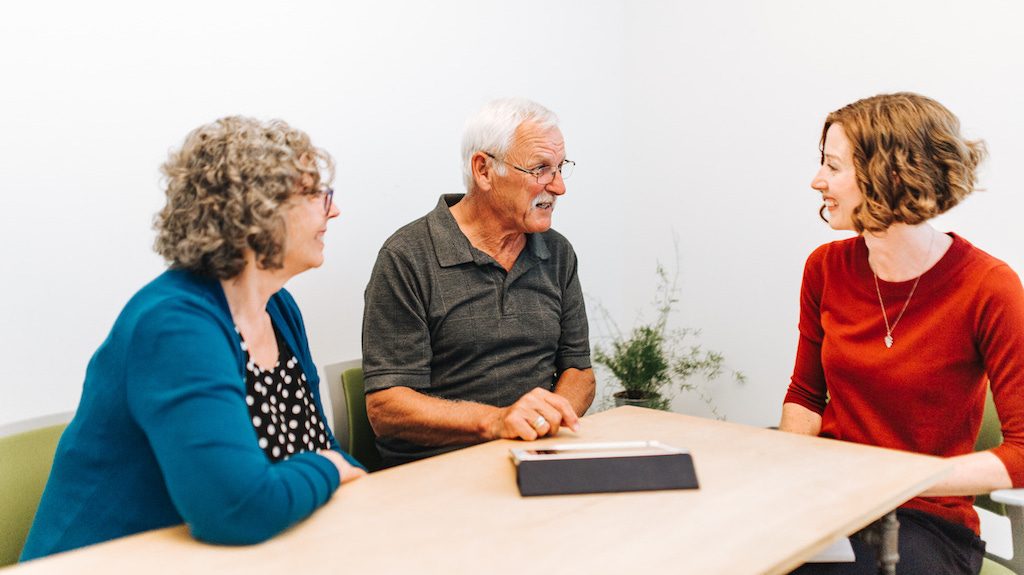Speech Therapy: What to Expect and How to Ask for What You Want
6 min read
If a loved one has suffered a stroke or a brain injury, or has a neurological disease that affects communication, you may find yourself suddenly enrolled in speech therapy.
It’s something nobody wants to need, but if your loved one needs it, speech therapy quickly becomes something you can’t get enough of. Limited availability, caps on funding, and a front-loaded medical system can make families feel as though the time they spend in speech therapy is far too short.
Here are some tips for making the most of the time you have in speech therapy.
Join In or Wait Outside During Speech Therapy Sessions?
The first question that comes up when you take your partner to therapy is whether you should stay in the room for the session.
Most of the time, it’s best for you to stay. You’ll see what the therapist does and learn how to do the same thing at home. The clinician can verify that you have the right information, teach you strategies, and even train you to be a better communication partner.
It may be best to leave the room though if your loved one is distracted by your presence, always looks to you for answers, or doesn’t try to participate.

The first session or two will probably be filled with tests, and it’s important that you don’t help or speak during the assessments. If you can sit quietly, it should be okay to be there. Your therapist will let you know otherwise.
Being a caregiver can be exhausting, and an hour of speech therapy may seem like a great time for you to run errands. But you’ll both get far more out of the experience if you stick around. If you need time to yourself, look for an adult daycare, a volunteer, or a respite program that can give you the break you need.
“I personally am very glad that I was able to sit in and observe my husband’s speech therapy. It proved invaluable to me, as I would be the one to support him in his therapy at home. I learned so much from his Speech Therapist and was able to truly see where my husband was struggling. I can now recognize his frustration when he has trouble and we work through it.” – Theresa Romijn, wife of a stroke survivor
Why All the Tests?
Speech-language pathologists (SLPs) or Speech-language therapists (SLTs) often have to administer standardized tests to determine their clients’ eligibility for speech therapy. They also need to gather baseline data, to learn what the clients can do before starting speech therapy, and to know where to begin.
Unfortunately, many tests don’t allow any help or confirmation of correct answers. This can make these tests a bit nerve-wracking. Don’t worry—the tests will help the therapist understand your loved one’s needs. They won’t last long, and your partner can’t “fail” them. Once they’re over, your loved one can spend the rest of the speech therapy time focused on getting better.
Goal-Focused Speech Therapy
After the tests, the SLP will set goals to guide your loved one’s speech therapy.
Therapists set what are called SMART goals. A SMART goal is:
- Specific—the goal is clear and unambiguous
- Measurable—the goal can be seen and measured in a concrete way
- Attainable—the goal is realistic; it may be challenging, but it’s not out of reach
- Relevant—the goal is worthwhile; it supports and is aligned with other goals, and team members buy into it
- Time-based—the goal has a specific target date.Figure 1. SMART goals are useful in many areas of life. When a goal is specific, measurable, attainable, relevant, and time-based, it creates a sense of optimism and urgency and gets you ready for success.
Unless a goal meets all five criteria (i.e., it’s specific, measurable, attainable, relevant, and time-based), it’s not likely to be helpful. You may not even know whether you’ve attained it.
When asked about their goals for speech therapy, clients and their families often say they want to “get back to normal.” While understandable, this is neither a specific nor a measurable goal for therapy. What does “normal” mean? How long will you wait before deciding whether you’re there? How will you know you’re there?
SMART goals for therapy might be something like:
- Client will use a first-letter self-cueing strategy when unable to think of a word in conversation at least 75% of the time within two weeks.
- Client will independently repeat unclear speech using a slower rate when not understood on 80% of occasions within three weeks.
As a first step, your loved one should try to identify exactly what he or she wants to achieve in the next few weeks or months. Once you have a goal, you and your partner can develop a plan for reaching it. If you don’t know what’s realistic, ask your therapist for advice. As Antoine de Saint-Exupéry wisely said, “A goal without a plan is just a wish.”

It’s a Goal! Setting Patient-Centered Speech Therapy Goals for Aphasia Rehabilitation
7 min read
What is Speech Therapy?
Speech therapy comes in many forms. A comprehensive therapy plan often includes four components:
- Remediation
- Compensation
- Education
- Participation
Remediation
Your loved one will probably be given exercises that remediate, or help improve the underlying problem. These exercises are opportunities to practice—in a supportive environment—the exact things he or she has trouble with.
Your loved one will probably have to repeat these exercises many times before the brain or behavior will change. Expect homework between speech therapy sessions.
Some people think therapy should be dedicated solely to remediation. Depending on the nature of the problem, this isn’t always the best approach. Instead of restoring abilities, some forms of speech therapy focus on preserving other abilities, or on using intact skills to compensate for impairments.
Compensation
Most speech therapy plans include compensatory strategies, which help a person make up for lost abilities. These are meant to teach skills you and your partner can use when it becomes difficult to communicate or think clearly.
Whether we realize it or not, we all use compensatory strategies. Many of us write our appointments in calendars so we don’t forget them, mentally scan through the alphabet when we can’t think of someone’s name, or repeat what we’ve said a bit louder when someone doesn’t hear us.
In speech therapy, your loved one will learn and practice compensatory strategies specific to their needs.
Education
Communication disorders are complex and emotional. A large part of speech therapy is therefore dedicated to education and counseling. Understanding the disorder and coming to accept its impact are important parts of the therapeutic process.
Your therapist may provide anatomical diagrams, brochures, websites, and other resources to help you and your partner understand what’s happening and why. He or she may also refer your loved one to other professionals or support groups that can help.
Participation
The end goal of therapy is to restore a person to full participation in life. Speech therapy therefore includes activities intended to help your loved one generalize or transfer (i.e., carry over) the skills learned in the therapy clinic into the outside world.
Once your partner has mastered speaking clearly in words, phrases, sentences, and conversations, for example, he or she may be asked to try speaking on the phone or speaking with strangers.
Speak Up!
Working in partnership often results in the most effective speech therapy, so speak up! Although your SLP is highly trained, knowledgeable, and an expert in communication disorders, you and your partner are the experts in your partner.
The therapist should ask about your loved one’s goals before deciding what to work on. If you or your partner have questions about what’s going on, or disagree with something, don’t be afraid to speak up.
The therapist wants to help, and gains nothing by providing less than effective therapy. He or she is not a mind reader. Get the most from your sessions by communicating openly and working collaboratively with the therapist.
When you and your loved one set SMART goals, and talk about remediation, compensation, education, and participation, you and your therapist are all speaking the same language.
With a Tactus Therapy app, you can get more repetitions and practice in between speech therapy sessions—and this can help speed up your progress. We have a wide range of apps for speech therapy to cover many goals and abilities. Use our App Finder to find the right apps for you.
